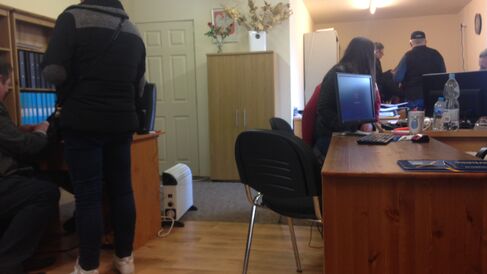
In some towns advice centres are being established that are aimed at helping migrant workers. Some of these centres are owned and run by EU nationals. We spent time speaking to advisers and clients and observing what happened at one advice centre in the East of England.
Adam and Irena: two farm workers
Adam previously worked as a warehouse operative in Poland. His income was low. He told us that he 'spontaneously' moved to the UK with his girlfriend, in search of a better life and opportunities to earn a better income. His first job was in a factory. He then found work on a farm. His children are still living in Poland with their grandparents because they work too hard in the UK and so don't have time to care for their children here. Benefits, he says, do not matter: 'We can work hard to survive'. Adam dreams of returning to Poland with his girlfriend but he tells us that there is no work. They have friends who are interested in moving to the UK but his advice to them is that it is a difficult process: it can be hard to find a good job, the cost of moving is high and the future in the UK is now very uncertain.
Irena worked as a shop assistant in Poland. Like Adam, her income was low. She found agricultural work in the UK through an agency and moved here in 2007. She has a university education but cannot speak English and so agricultural work is really the only option for her. She has found it very difficult to integrate with local society. She doesn't worry about the UK leaving the EU because she came here to work and save money, but she does feel, as a matter of principle, that anyone who finds themselves in a difficult situation and who works in the UK ought to be entitled to help on the same terms as British nationals. Irena hopes to continue living in the UK, have a family and buy a house.
Piotr: a temporary visitor
Piotr's parents-in-law live in the UK so he is visiting them just for one week. He works in Warsaw but he finds life in Poland very difficult. He is currently waiting for his wife to finish her PhD but they already have plans to come to the UK and live near her parents. When we ask him about benefits he tells us that they are not important in making the decision about whether to move to the UK or not. He thinks that Brexit would be beneficial for Polish workers who are already living in the UK because it would make the jobs market less competitive.
Tomasz: a lorry driver
Tomas came to the UK because there were more opportunities to develop personally and professionally and jobs in the UK are better paid than in Poland. His biggest disappointment has been British weather! Tomasz plans to open his own business because it is easier to do this in the UK than in Poland. He believes that the UK will vote to leave the EU but this does not worry him because he does not think this will affect people who already live in the UK (even if they are not UK citizens). He told us that he has never claimed benefits but that he would like the chance to do so if, for example, he was unwell.
Julia: a recruitment advisor
Julia moved to the UK straight after finishing secondary school in the hope that she would find a better quality of life her. She told us that she has claimed benefits in the past, when her marriage broke down and she first became a single mother. She was grateful for this support through a difficult time in her life but she is now very pleased to be able to work part time alongside caring for her children as a single mum.
Julia tells us that she is not really interested in the politics of Brexit, but she wants to continue living in the UK. Her children were born here and feel that the UK is their home. She feels that they have a better quality of life as a family in the UK compared to Poland. Even though she thinks the National Health System is very good, she says that she uses a private Polish clinic in the UK whenever she has a serious health problem.
Krystyna: a financial advisor
Krystyna moved to the UK seven years ago with her family. She moved to the UK from a very poor region in Poland were there was high unemployment. She feels very glad to have a good job, to own her own home and that her children are receiving an excellent education. Krystyna tells us that she has only claimed benefits once, when her husband lost his job. She found the system difficult to navigate and she now regrets ever making a claim because she has now been told that she has to repay the help that they received. She doesn't know how to appeal against that decision. The experience has made her afraid to apply for any help in the future, even if she really needs it. Her view is that benefits should be available for everyone who works in the UK and contributes to the economy.
Through her work Krystyna has developed a lot of understanding of the sorts of difficulties migrants face in the UK. She says that being unable to speak English is the most significant barrier. Many migrants, she says, are unaware of their rights in the UK and agencies often do not pay them for holiday or sick leave. Sometimes agencies do not pay their national insurance. There are sometimes problems with discrimination between different migrant groups within a workplace, such as between Polish and Lithuanian workers in a factory.
